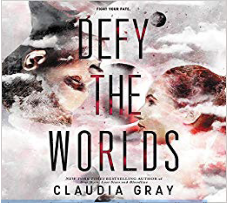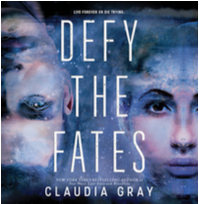Jennifer R. Gardner
Staff Writer
The final installment of the “Constellation” series “Defy the Fates” by Claudia Grey was released April 2 of this year. After about a year-long wait “Constellation” fans can finally sink their teeth into this conclusion. For a series recap, the story centers around teenage orphan Noemi Videl who goes off to fight for her planet’s independence from Earth in a futuristic setting where the Earth has been revenged from years of pollution and overcrowded conditions. The Earth wants to use up their other interplanetary colonies for resources and land against their will which causes a war between the colonies and Earth. During this war, Noemi stumbles across a forgotten mech, a sort of cyborg android, Abel who had been left behind by his father and creator Mansfield. As the series goes on, both Noemi and Abel travel across different star systems and learn to look deeper into themselves and the world around them. Along the way, these two encounter many new people, obstacles, and moral dilemmas that force them way past their comfort zones and boundaries.While this series was a pretty interesting ride, it did fail to fully utilize the sci-fi premise as it leaned heavily on troupes for its plot’s major developments.This reliance on troupes wasn’t a bad thing but the series as a whole could have definitely gone deeper into the ideas it presented.
The first area needing development was its use of supporting side characters. But the very diverse supporting cast, with differing motivations, was one of the positive things in the series. Aside from the main characters, they aren’t given as much time for the audience to get to know or care about. An example of this is with Virginia Redbird, a sassy tech nerd who definitely provided some of the comic relief within the story. She could have easily been included as one of the main characters if she had been given more time with the audience and a bigger role to play other than the ship’s main mechanic. Because the story focuses so much on Noemi and Abel, Virginia is forced into the limelight time and time again. This kind of treatment would be fine if she weren’t such a big part of the plot. Her quick-wit and backstory are eclipsed by the slow burn romance between Noemi and Abel. While Virginia’s neglect could be justified by her tendency to be a lone wolf, there are other characters whose ideas and gray morals could have been better explored, either with more conversation or a better fleshing out of their backstory. This problem is obvious with the lack of attention towards the leader of the terrorist group Remedy. The author meant for her, Riko, to be morally gray in that she uses excessive threat because she feels it is the only way to stop Earth’s tyranny.What the author does well with this character is that she shows her twisted moral compass and how it hurts the resistance rather than aid it, but what could have made this better was if the audience was more acquainted with Riko herself and with Remedy’s other members. By showing the audience how other members of Remedy feel about their actions towards the Earth and how it impacts them, their families, and their small community, the story could have taken a grittier tone and opened up a deeper discussion about how oppression brings out the worst in human nature.
Furthermore, for a book that claims to explore distant planets and star systems, it sure spends a lot of time with Noemi and Abel. Alone. On a spaceship.Talking. Putting all of the plots’ weight upon these two characters is a bit risky but for the most part, thanks to the couple’s banter and personal growth, these long stretches of them just traveling around and spending time with each other were some of the most charming scenes. But when you have an intergalactic war with differing perspectives, characters, planets, and challenging moral dilemmas just waiting in the background of the plot, it can seem a bit too convenient for them to just have all this time to themselves. There’s a part of the first book, “Defy the Stars” where Noemi and Abel watch Casablanca as they wait for the repairs on their ship to finish. Now, this was a pretty cute scene that added a bit more fleshing out to Noemi’s backstory and how the loss of her family had affected her, but the way the author does this is through dialogue.What could have shown through Noemi’s interactions with other character and help her grow herself outside of the Earthship she has with Abel is instead told to the audience directly from Noemi herself. Usually, authors follow the mantra of ‘show don’t tell’ but with Grey, she’s using dialogue and inner thought to convey and explain too much of the character’s actions to the audience. If the goal for the main character was embedded a bit better than the audience would not need constant reminders on why Noemi and Abel are scrambling around the galaxy like lost chickens.
This leads into the third issue that hinders the book’s overall impact and pacing. Now pacing is a tricky subject, some books and media do it perfectly and some miss the mark, but that said a general rule of thumb is that the pace you have in the first chapter of a book is the one you have to try and at least stay somewhat true to. With the first book in the series, the pacing started out slow and stayed that steady but was completely thrown kilter with the third book “Defy the Fates”. One of the main concerns fans of this series had was that the third book was considerably smaller than the first, something very unusual for the final book in a series in comparison with other literary works. For reference “Defy the Stars” had 501 pages while “Defy the Fates” had little over 466 pages. A 35-page difference may not seem like a lot but take other book series like “Harry Potter” with a 374-page difference between its first and final installment. Now a page difference may not be as big a deal, but seeing as “Defy the Fates” was meant to tie up all the loose ends and leave the audience with something to take away from the book series as a whole, it should have been longer. This ties into the final book’s weird pacing because, even though it was shorter, it still had an almost laughable amount of added drama between the characters, planets, and Abel’s creator. Now, this could be seen as a good thing, if the audience had been given more time with the supporting cast and the world. But to rip us from the main characters and shift the previously established focus is quite jarring.
All this being said, the “Constellation” series still had redeemable qualities that pushed it past being a mediocre read. But those same qualities should have been utilized to a greater degree within the story’s narrative to make it a stronger and overall more satisfying ending.What could have been a fantastic cautionary tale about the exploitation of resources and how oppression impacts different groups of people was not given enough breathing room to become more than a slow burn romance with bits of action sprinkled in.



